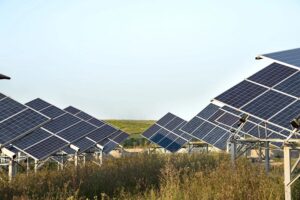
According to Serbian Economist, the municipality of Knyazhevats has begun the process of preparing a detailed regulation plan for the construction of the Knyazhevats solar power plant in the community, as follows from the decision to develop planning documentation.
The deadline for preparing the plan is set at 12 months. The municipal administration (urban planning and construction) has been designated as the project manager, Projektura d.o.o. (Belgrade) as the developer, and Central Europe Energy Company d.o.o. (Belgrade) as the initiator, which is also financing the preparation of the documentation.
The project involves the construction of Serbia’s largest solar park in Tresibabi with a capacity of 170 MW, with investments estimated at approximately €200 million.
Approximately 270 hectares of low-quality state-owned land have been leased for the project, with a lease rate of €1,050 per hectare per year, of which 40% goes to the community budget and 60% to the republican budget.
Central Europe Energy Company is registered in Belgrade, with Qin Zhang listed as the responsible person, according to CompanyWall data.
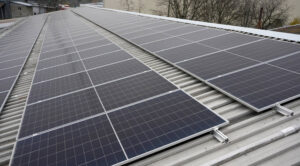
Argon Food, a company specializing in the production of bakery products and the storage and transportation of other food products, has installed a solar power plant with a peak capacity of 114 kW, according to Andriy Ocheretny, deputy mayor of Vinnytsia, on Facebook.
“A solar power plant with a peak capacity of 114 kW was installed on the roof of the enterprise. The station was put into operation at the end of May, and since then, thanks to its operation, the enterprise has covered almost all of its electricity needs,” he wrote on Facebook.
According to Ocheretny, the company has become one of the applicants for participation in the Procedure for partial compensation of expenses for the purchase of equipment used for the production of electricity from renewable energy sources within the city program.
“In the context of blackouts, the transition to ”green” energy is the path to energy independence. This strategic decision helps businesses reduce production costs, retain staff, and create new jobs, while contributing to the sustainable development of the community,” concluded the deputy mayor of Vinnytsia.
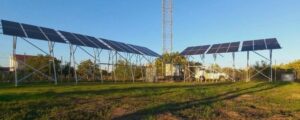
Ukraine’s second-largest mobile operator, VFU (Vodafone Ukraine), plans to install solar power plants (SPPs) at 100 mobile base stations across Ukraine by the end of 2025 – early 2026, according to a company press release.
It is noted that the total installed capacity of the SPPs is 360 kW, each system will include solar panels and inverters with a capacity of 3.6 kW, which will allow the use of solar energy during peak loads or power outages.
The operator noted that such systems will reduce consumption from the centralized power grid by about 300 MWh per year, reduce the load on the power system during peak hours, reduce CO2 emissions by 210 tons per year, and generate savings by reducing electricity costs.
Vodafone Ukraine added that the technology was tested over four seasons at three base stations in the Poltava region and the city of Dnipro. The pilot projects revealed a significant reduction in electricity consumption from the grid, a reduction in the load on the power grid during the day, and the reliability of the technology in climatic conditions, especially during periods of high solar activity.
As reported, Vodafone Ukraine reduced its net profit by 13% in the first half of 2025 compared to the same period last year, to UAH 1.705 billion, while its revenue grew by 15%, to UAH 13.518 billion.
In the first half of the year, the company increased its investments by 66% compared to the same period in 2024, investing more than UAH 3.5 billion in critical infrastructure, and in total, over 3.5 years of full-scale war, investments in Ukraine reached almost UAH 19 billion. In the structure of investments in the first half of this year, 51% is accounted for by the construction and restoration of the network, as well as its preparation for operation during blackouts, 31% – network maintenance, 11% – fixed-line communications development, and 4% – the billing exchange program.
Vodafone Ukraine has been part of NEQSOL Holding since December 2019.
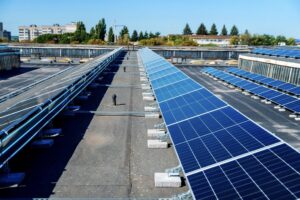
A large Ukrainian manufacturer of heating devices and equipment for heating systems (TM Termia), JSC Vinnytsia Mayak Plant, has installed its own solar power plant (SPP), according to Andriy Ocheretny, deputy head of the Vinnytsia City Council.
“The SPP was launched on September 19, 2025. A total of 384 solar panels were installed. The peak capacity is 236.16 kW,” he wrote on Facebook on Thursday.
As specified by City Council Deputy Vyacheslav Terlikovsky, the enterprise took advantage of the Vinnytsia City Council’s program to compensate for the cost of equipment from renewable energy sources.
According to him, the installation of the SES was carried out by Promavtomatika Vinnytsia LLC, which will also provide further maintenance.
The Mayak plant, under the Termia trademark, manufactures, among other things, air heating units (heat guns, fan heaters, air curtains), electric convectors, electric boilers, and heating radiators.
According to the company’s annual report on its website, in 2024, its consolidated net profit decreased by 2.4 times compared to 2023, to UAH 7.6 million, and net income decreased by 10%, to UAH 251.6 million.
Ocheretny also reported that an application for compensation from the Vinnytsia City Council for the purchase of equipment for the production of electricity from renewable sources was submitted by PP “Konex,” which specializes in the trade of pharmaceutical products.
“PP Konex now also has its own solar power plant with a total capacity of 60 kW. In total, 108 panels (560 W each) and 20 storage batteries (5.12 kW each) are installed on the roof of the enterprise,” he wrote.
According to its website, the Konex pharmacy chain has more than 200 pharmacies in the Vinnytsia, Khmelnytskyi, Chernivtsi, Cherkasy, Kirovohrad, Zhytomyr, Ivano-Frankivsk, Kyiv, Rivne, Ternopil, and Odesa regions.
According to its report, Konex earned UAH 51.8 million in net profit and UAH 3.5 billion in revenue in 2024.
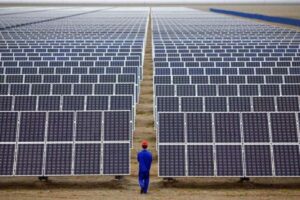
Masdar (UAE) has begun construction of Azerbaijan’s largest solar power plant with a capacity of 445 MW.
“As part of the project implemented by Masdar, the installation of the first solar panel support for the Bilasuvar solar power plant and construction work in general began on August 12,” according to a statement on the official social media page of the Bilasuvar district administration (in the south of the country). An area of 1,454 hectares has been allocated for the construction of the plant.
“The Bilasuvar solar power plant will make an important contribution to increasing renewable energy production in the country, increasing the share of clean energy in the energy balance, and developing a green energy policy,” the statement said.
As reported, the groundbreaking ceremony for the 445 MW Bilasuvar and 315 MW Neftchala solar power plants took place during Baku Energy Week in June 2024. Both plants are scheduled to be commissioned in 2027.
Once completed, the two solar power plants are expected to generate around 1.7 billion kWh of electricity per year. Their launch will also reduce carbon dioxide emissions by approximately 830 million tons per year and lead to annual savings of 380 million cubic meters of natural gas. The total cost of the solar power plants is estimated at $670 million. These projects are being implemented by Masdar in cooperation with SOCAR Green (a subsidiary of the State Oil Company of Azerbaijan, SOCAR). SOCAR Green’s share in each of the projects is 25%. The Bilasuvar plant will generate 897 million kWh of electricity per year, supplying power to 179,000 consumers (homes) and saving 193 million cubic meters of gas annually.